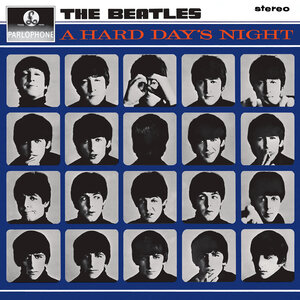
A Hard Day's Night is the third studio album by the English rock band the Beatles, released on 10 July 1964 by Parlophone, with side one containing songs from the soundtrack to their film of the same name. The American version of the album was released two weeks earlier, on 26 June 1964 by United Artists Records, with a different track listing that included selections from George Martin's film score. In contrast to the Beatles' first two albums, all 13 tracks on A Hard Day's Night were written by John Lennon and Paul McCartney, showcasing the development of their songwriting partnership.

Help! is the fifth studio album by the English rock band the Beatles and the soundtrack to their film of the same name. It was released on 6 August 1965 by Parlophone. Seven of the fourteen songs, including the singles "Help!" and "Ticket to Ride", appeared in the film and take up the first side of the vinyl album. The second side includes "Yesterday", the most-covered song ever written. The album was met with favourable critical reviews and topped the Australian, German, British and American charts.

Arthur Alexander was an American country-soul songwriter and singer. Jason Ankeny, music critic for AllMusic, said Alexander was a "country-soul pioneer" and that, though largely unknown, "his music is the stuff of genius, a poignant and deeply intimate body of work on par with the best of his contemporaries." Alexander's songs were covered by such stars as the Beatles, the Rolling Stones, Bob Dylan, Gerry and the Pacemakers, Otis Redding, Tina Turner, Pearl Jam, and Jerry Lee Lewis.

Run Devil Run is the eleventh solo studio album by Paul McCartney, released in 1999. It features mostly covers of both familiar and obscure 1950s rock and roll songs, along with three original McCartney compositions written in the same style, including the title track, making it the second McCartney covers album, after his Russian cover album. As his first project following first wife Linda's death in 1998, McCartney felt the need to get back to his roots and perform some of the music he loved as a teenager. On 14 December 1999, McCartney returned to the Cavern Club stage to play a set publicising the new album.

Something New is an album by English rock band the Beatles, released in 1964 for the North American market only.

McCartney is the debut solo album by English musician Paul McCartney, released on 17 April 1970 by Apple Records. McCartney recorded it in secrecy, mostly using basic home-recording equipment at his house in St John's Wood. Mixing and some recording took place at professional London studios. In its loosely arranged performances, McCartney eschewed the polish of the Beatles' past records in favour of a lo-fi style. Apart from occasional contributions by his wife, Linda, McCartney performed the entire album alone by overdubbing on four-track tape.

Anthony Esmond Sheridan McGinnity, known professionally as Tony Sheridan, was an English rock and roll guitarist who spent much of his adult life in Germany. He was best known as an early collaborator of the Beatles, one of two non-Beatles to receive label performance credit on a record with the group, and the only non-Beatle to appear as lead singer on a Beatles recording which charted as a single.
In the field of recorded music, a hidden track is a song or a piece of audio that has been placed on a CD, audio cassette, LP record, or other recorded medium, in such a way as to avoid detection by the casual listener. In some cases, the piece of music may simply have been left off the track listing, while in other cases, more elaborate methods are used. In rare cases, a 'hidden track' is actually the result of an error that occurred during the mastering stage production of the recorded media. However, since the rise of digital and streaming services such as iTunes and Spotify in the late 2000s and early 2010s, the inclusion of hidden tracks has declined on studio albums.

"Don't Pass Me By" is a song by the English rock band the Beatles from their 1968 double album The Beatles. A country rock song, it was the first solo composition written by drummer Ringo Starr.

"Flying" is an instrumental recorded by the English rock band The Beatles which first appeared on the 1967 Magical Mystery Tour release. It is one of the few songs credited to all four members of the band: John Lennon, Paul McCartney, George Harrison and Ringo Starr.
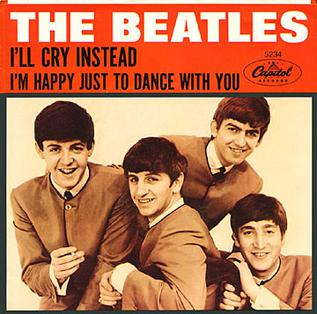
"I'll Cry Instead" is a song written by John Lennon, and recorded by the English rock band the Beatles for their third studio album, A Hard Day's Night (1964), a part-studio and part-soundtrack album to their film of the same name (1964). In the United States, the song originally appeared in the US version of A Hard Day's Night before it was released as a single backed with "I'm Happy Just to Dance with You" along with the US album Something New.

McCartney II is the second solo studio album by the English musician Paul McCartney, released on 16 May 1980. It was recorded by McCartney at his home studio in the summer of 1979, shortly before the dissolution of his band Wings in 1981. Like his debut solo studio album, McCartney (1970), he performed all the instruments himself. It yielded three singles: "Coming Up", "Waterfalls", and "Temporary Secretary".

"Cry for a Shadow" is an instrumental rock piece recorded by the Beatles on 22 June 1961. They recorded the song at Friedrich-Ebert-Halle within the gymnasium, Hamburg, West Germany while they were performing as Tony Sheridan's backing band for a few tracks, under the moniker the Beat Brothers. It was written by George Harrison with John Lennon, as a pastiche of the Shadows' style. It is the only Beatles track to be credited to Lennon and Harrison alone.
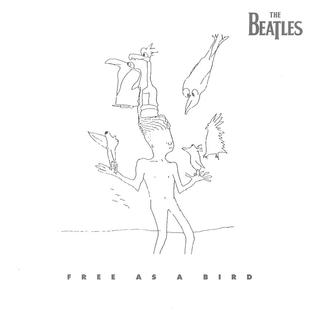
"Free as a Bird" is a single released in December 1995 by English rock band the Beatles. The song was originally written and recorded in 1977 as a home demo by John Lennon. In 1995, 25 years after their break-up and 15 years after Lennon's murder, his then surviving bandmates Paul McCartney, George Harrison and Ringo Starr released a studio version incorporating the demo.

James Louis McCartney is an English-American musician and songwriter. He is the son of singer, songwriter, and former Beatle, Paul McCartney. He has contributed to solo albums by his parents, including Flaming Pie (1997) and Driving Rain (2001) by Paul McCartney, and Wide Prairie (1998) by Linda McCartney. He has released two EPs and two albums. His most recent, The Blackberry Train, was released on 6 May 2016.
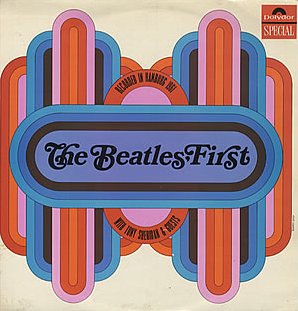
The Beatles' First! is a German compilation album of songs recorded in Hamburg in 1961 and 1962 by Tony Sheridan with the Beatles as his backing group. It was originally released in 1964 in Germany, then issued in 1967 in England, 1969 in Canada and finally in the United States in 1970.

Love is a soundtrack remix album of music recorded by the Beatles, released in November 2006. It features music compiled and remixed as a mashup for the Cirque du Soleil show Love. The album was produced by George Martin and his son Giles Martin, who said, "What people will be hearing on the album is a new experience, a way of re-living the whole Beatles musical lifespan in a very condensed period."
Translator is an American rock band from San Francisco that had success during the 1980s, which continues into the present day. The group created a sound that spanned updated British Merseybeat and stripped-down punk-like rock to psychedelia. Inspired by the Beatles, Cream and 1960s California folk rock bands such as the Byrds, their guitar-based music had wide exposure during the early 1980s on non-commercial campus radio and new wave music stations. The group's stripped-down music and sometimes ironic and disturbing existentialist lyrics may have been a precursor to alternative rock.
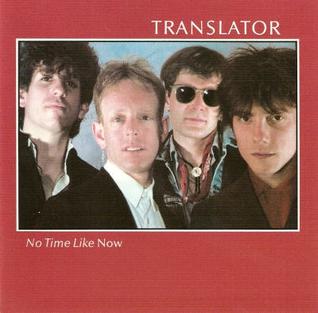
No Time Like Now is the second album from Translator, released in August 1983 on 415 Records and distributed by Columbia Records.
Return to Pepperland is the name given to an unfinished recording project by English musician Paul McCartney with American record producer Phil Ramone. The songs recorded during these sessions have been the basis of bootleg albums usually titled Return to Pepperland.

















